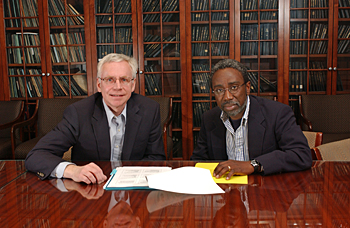Douglas Buttrey, professor of chemical engineering, will teach a course in engineering thermodynamics, and Babatunde Ogunnaike, the William L. Friend Professor of Chemical Engineering, will teach a course on probability and statistics for engineers to beginning graduate students.
The courses are designed to prepare the students for subsequent concentration in petrochemical engineering, materials engineering or environmental engineering sub-disciplines. The courses will each involve three hours of lecture each day, five days a week, for three weeks.
“It is very important that we in the developed world do what we can to help to seed development in sub-Saharan Africa,” Buttrey said. “Access to high-quality education is a critical component of this, and evidence of this can easily be seen by comparison with development in India over the past half-century, where the foundation of the Indian Institutes of Technology, starting with IIT-Bombay in 1958, helped to plant seeds for development there. The AUST is modeled after the successful IIT system, but differs in important ways, such as encouraging involvement of faculty from well-recognized programs around the world.”
Buttrey earned a bachelor's degree in biology at Wayne State University in 1976. He received a master's degree in biochemistry and a doctorate in chemistry at Purdue University in 1978 and 1984, respectively. He joined UD in 1987 and served as a visiting scientist in the physics department of the Brookhaven National Laboratory from 1997-98, and as a visiting professor at the NanoCenter in the physics department of the University of South Carolina in Columbia, S.C., in fall 2007. This past winter, Buttrey was a visiting professor at the Catalysis Research Center of Hokkaido University in Sapporo, Japan.
Ogunnaike said the teaching opportunity is a small way in which UD can begin to fashion a conduit for exchanging people, programs, resources and research activities between the departments of chemical engineering at UD and the AUSTs.
Ogunnaike earned a bachelor's degree in chemical engineering from the University of Lagos in Nigeria in 1976, a master's degree in statistics and doctorate in chemical engineering from the University of Wisconsin, Madison, in 1981. He went back to the University of Lagos in 1982 as an assistant professor and was on the faculty until 1988, when he returned to the U.S. He joined UD in the fall of 2002 after 13 years at the DuPont Central Research and Development organization.
“Perhaps this may lead to connections with other departments and centers at UD and elsewhere in future,” Ogunnaike said. “UD has been involved in African concerns previously, such as with the successful Engineers without Borders program organized by Steve Dentel. This is the first time for UD to be involved with the AUST, since it is a new university. We hope to continue involvement with teaching at the AUST in Abuja, and perhaps at additional AUST sites as they are established--at least four are planned--and to expand this involvement to couple research programs and examine ways of exchanging students.”
AUST Abuja was established by the Nelson Mandela Institution (NMI) in 2007 as the first of a Pan-African network of institutes of science and technology and centers of excellence located across the continent. AUST Abuja, a National Universities Commission (NUC) accredited university, aims to become a world-class research oriented institution whose final objectives are to train and develop the next generation of African scientists and engineers and impact profoundly the continent's development through science and technology applications.
AUST is an independent, not for profit university with a transparent governance system whose parent, NMI, is a private charity incorporated in the U.S.
Article by Martin Mbugua
Photo by Duane Perry


